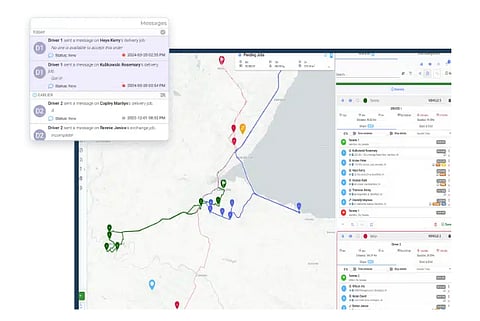

In today’s fast-paced logistics and delivery environment, companies are under constant pressure to deliver goods faster, cheaper, and more efficiently. Whether it’s e-commerce, retail, or wholesale distribution, every delivery operation requires proper planning and execution. This is where fleet routing software comes into play. By automating route planning and fleet management, businesses can save time, reduce costs, and enhance customer satisfaction. We will dive deep into the role of fleet routing software, its key features, benefits, and how it can transform logistics for modern businesses.
Fleet routing software is a technology solution that helps businesses plan, manage, and optimize delivery routes for their fleet of vehicles. Instead of relying on manual planning or static maps, businesses can use real-time data, traffic updates, and advanced algorithms to create the most efficient delivery routes.
This software is not limited to just route planning; it also enables fleet managers to track vehicles, assign tasks, monitor fuel usage, and improve driver productivity. In short, it acts as a complete delivery management tool that enhances operational efficiency.
Without proper route optimization, delivery operations can quickly become expensive and inefficient. Factors like fuel costs, idle time, delivery delays, and vehicle maintenance add up, eating into profits. Fleet routing software ensures that your fleet is always on the best possible route, reducing wasted time and resources.
Here are some key reasons why businesses are adopting this technology:
Cost Reduction—Optimized routes lead to reduced fuel consumption and fewer maintenance expenses.
Time Efficiency – Faster deliveries improve productivity and customer satisfaction.
Real-Time Tracking—Fleet managers can monitor vehicles and delivery progress in real time.
Scalability—The software grows with your business, managing small or large fleets with ease.
Customer Experience—Accurate ETAs and faster deliveries boost customer trust and loyalty.
Modern fleet routing software comes with advanced features that simplify complex delivery operations. Some of the most important ones include:
The software automatically selects the fastest and most fuel-efficient routes by considering traffic, weather, road closures, and delivery priorities.
Fleet managers can track vehicles live, ensuring drivers stick to planned routes while avoiding delays.
Instead of assigning deliveries manually, the software automates driver assignments based on availability, proximity, and vehicle type.
Digital proof of delivery (signatures, photos, or barcodes) eliminates paperwork and ensures transparency.
With data-driven insights, businesses can analyze driver performance, fuel consumption, and delivery efficiency.
Fleet routing systems can integrate with CRM, ERP, and warehouse management software to create a seamless logistics ecosystem.
Implementing fleet routing software offers both immediate and long-term benefits to businesses.
Reduced Operational Costs—Optimized fuel usage and maintenance savings help cut expenses.
Improved Productivity – Drivers complete more deliveries in less time.
Enhanced Customer Satisfaction—Real-time updates and faster deliveries keep customers informed and happy.
Better Compliance and Safety – Monitoring ensures adherence to driving hours, reducing risks of accidents.
Sustainability—Efficient routes lower carbon emissions, helping companies meet green initiatives.
Imagine running a logistics operation without automation. Manual route planning can take hours, is prone to errors, and often results in inefficiencies. Fleet routing software eliminates these issues by:
Automating Planning – Saves time for fleet managers.
Optimizing Delivery Windows – Ensures on-time deliveries.
Reducing Errors—Minimizes human error in dispatching.
Scaling Operations—Easily accommodates seasonal demand spikes.
The result is a logistics system that is smarter, faster, and more reliable.
With so many options available, selecting the right fleet routing software depends on your business needs. Here are some factors to consider:
Ease of Use—The interface should be user-friendly for both managers and drivers.
Customization—Choose software that can adapt to your business model.
Scalability—Ensure the system can handle future growth.
Support and Training—Reliable customer support and onboarding assistance are essential.
Integration Capabilities – It should connect seamlessly with your existing systems.
As technology advances, fleet routing software is becoming more intelligent with AI, machine learning, and predictive analytics. These innovations will allow businesses to:
Predict traffic conditions with greater accuracy.
Anticipate vehicle maintenance before breakdowns.
Use data to improve driver behavior and safety.
Provide hyper-accurate delivery ETAs.
Businesses that adopt advanced fleet routing solutions now will gain a competitive edge as logistics becomes increasingly data-driven.
Efficient fleet management is no longer optional; it’s essential for businesses that want to stay competitive. Fleet routing software empowers organizations to cut costs, increase efficiency, and deliver better customer experiences. From real-time route optimization to automated dispatching and analytics, this technology transforms the way deliveries are managed. Companies that invest in the right fleet routing software will not only streamline their operations but also gain the flexibility and scalability needed to grow in an evolving market. If you’re looking to optimize your fleet operations with powerful routing tools, explore more at Cigo Tracker’s Fleet Route Management.
